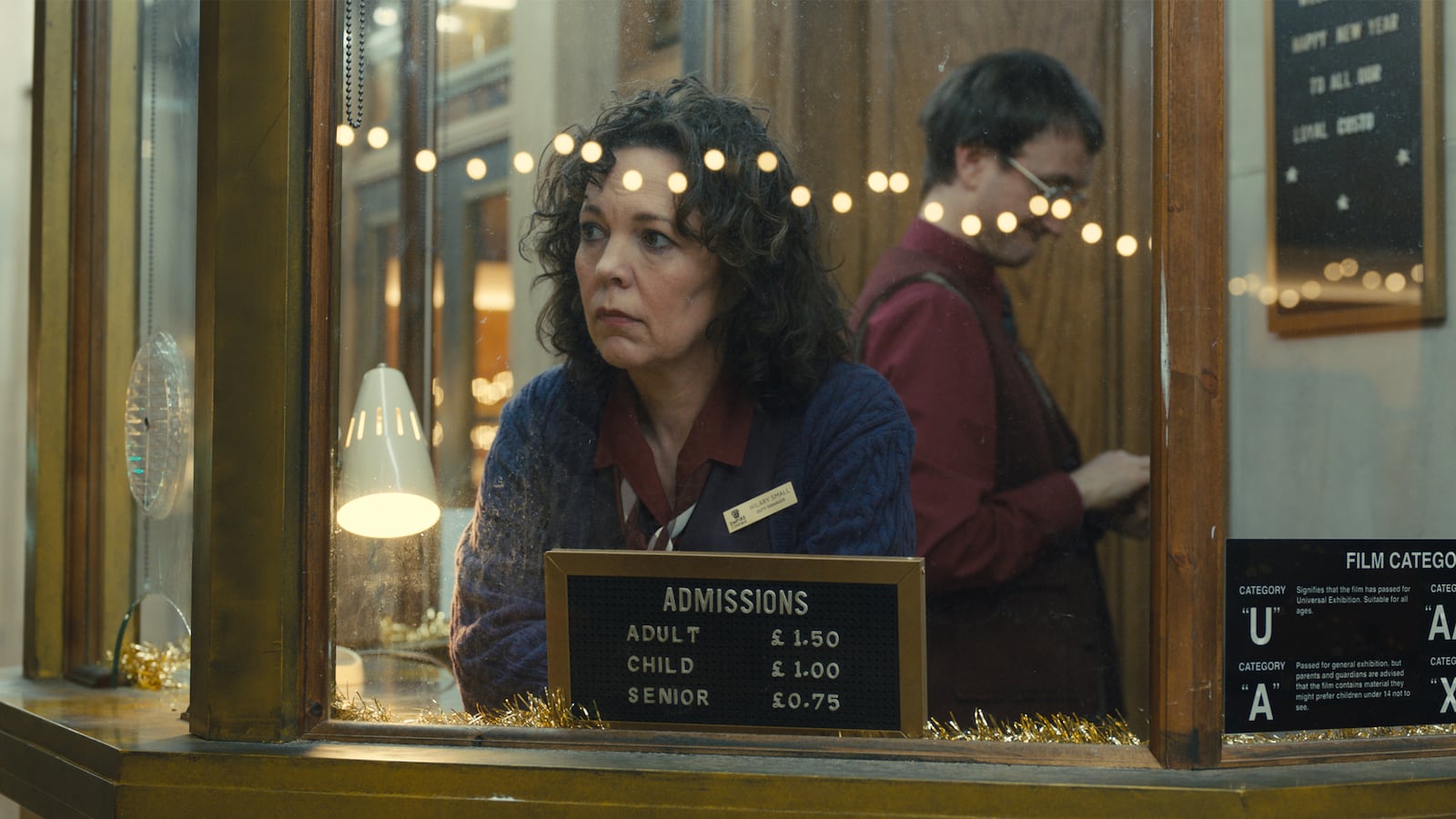Olivia Colman is one of contemporary film’s great actresses and Roger Deakins one of its legendary cinematographers, and yet neither artist’s Herculean efforts can sufficiently elevate Empire of Light (Dec. 9, in theaters), writer/director Sam Mendes’ quasi-autobiographical tale about romance, intolerance, illness, and the illuminating power of cinema.
The story of an older white woman and younger Black man who develop an amorous bond while working together at a fading English movie palace, it’s a typical award-season venture—stately, respectable, and imbued with hints of “timeliness”—that proves too clumsy to effectively tie its thematic threads together, and too schematic to stir the heart.
Every third composition in Empire of Light is a stunner courtesy of Mendes and frequent collaborator Deakins, whose partnership (which includes Jarhead, Revolutionary Road, Skyfall, and 1917) continues to reap visual wonders. From an early nighttime rooftop rendezvous irradiated by fireworks and a glowing vertical neon sign, to a late shot of a projectionist switching off the lights in his headshot-decorated booth, the film is another splendid showcase for the duo’s aesthetic gifts.
Even when their images border on the prosaic—such as an upturned shot of Colman gazing at a giant screen in an empty theater, which might as well be from Nicole Kidman’s AMC commercial—they’re so ravishing that they imbue the material with a sense of grief, resentment, and yearning for solace and companionship in a world that offers little to its characters.

At the center of Empire of Light’s quiet maelstrom is Hilary Small (Colman), a spinster who, in 1980, works in the beachside Empire theater, serving as “duty manager” and manning the concession counter as patrons come to see All That Jazz and The Blues Brothers. Hilary’s face is frozen in a saggy, forlorn expression, and her disposition isn’t helped by a doctor who, during a checkup, chastises her for gaining weight and orders her to take his prescribed Lithium.
Alone and miserable living in a modest and messy flat, Hilary’s only genuine human contact comes from occasional joking-around with colleagues Neil (Tom Brooke) and Janine (Hannah Onslow)—whose hair and makeup suggest she’s a big fan of The Cure—and mandated trips to the office of her married boss Mr. Ellis (Colin Firth), during which she pleasures him in the dark with dutiful, disgusted resignation.
Hilary’s bleak existence is transformed by a bolt of lightning that arrives in the form of Stephen (Michael Ward), a Black high school graduate who, having failed to get into college to study architecture, takes a job at the Empire. One glance at Stephen’s exposed midriff is enough to stir Hilary’s long-dormant spirit (and libido).
She becomes further smitten when she gives him a tour of the once-lavish Empire’s abandoned upper floor—which housed two more screens as well as a grand ballroom that’s now coated in dust and populated by pigeons—and he’s awed by its distressed but still potent beauty. If that weren’t enough to suggest that he might see something “special” in Hilary, his subsequent effort to medically aid a bird with a broken wing definitively confirms that Stephen is an individual with a predisposition toward solitary, wounded souls in need of tender, loving care.
Mendes’ script doesn’t unduly stress those notions but Empire of Light nonetheless only flirts with subtlety, and it’s not long before Hilary and Stephen are exploring their feelings for each other in the Empire’s cordoned-off upstairs. This attracts Neil’s attention but Hilary doesn’t mind because she’s enlivened by Stephen’s affection, which compels her to ditch her medication.
At a gala premiere of Chariots of Fire that Ellis views as the crowning achievement of his career, the newly empowered Hilary stands up for herself against her exploitative employer. This act, alas, is also precipitated by Stephen’s decision to call things off with Hilary, thereby sending her into a tailspin that—in a twist that comes as a bit of a shock and necessitates a reconsideration of her plight—reveals her to be mentally ill, replete with a history of prior stays at a psychiatric facility.

Whereas Stephen and Hilary are initially linked by their shared isolation, Empire of Light subsequently casts them as victims of personal circumstances out of their control, as well as a society that treats them with cruelty instead of compassion. Be it from customers, street thugs, or a parade of skinheads, Stephen is routinely plagued by the racism that’s running rife throughout Margaret Thatcher’s England, and Mendes’ saga attempts to parallel that abuse with the mistreatment Hilary suffers because of her condition.
Yet even if those two predicaments were analogous—which is up for healthy debate—the film’s equivalence is too threadbare, and handled too gently, to be persuasive. Ward and Colman share a believable, easygoing chemistry, but their protagonists’ deeper connection as kindred persecuted outsiders never quite resonates except as a device intended to let the material touch upon issues of race, class and age.
Even so, Colman is radiant in a role that allows her to spontaneously transition between sullenness, euphoria, and mania born, it’s suggested, from a lifetime of patriarchal oppression, of which Ellis’ conduct is merely the latest example. Hilary has been imagined as a conventional figure of suffering and longing, but the actress imbues her with an idiosyncratic prickliness and instability that turns her into more than the sum of her familiar parts.
While one’s head says that Hilary resembles a stock character, Colman makes her feel like a three-dimensional human being contending with a batch of roiling internal and external forces. It’s a magic trick, to be sure, and it goes at least some way toward selling Empire of Light’s sketchy celebration of cinema as something that reflects (and, in some ways, is) real life—a concept that pops up once or twice thanks to Toby Jones’ projectionist.
Unfortunately, Empire of Light never says anything much about the movies; Mendes primarily employs blockbuster American and British features as period-piece contextual markers. Worse, though, he’s ultimately content to rely on Trent Reznor and Atticus Ross’ plaintive-piano score to do the poignant heavy lifting, and to resort to comforting storytelling clichés – about psychological disorders and Black-white relations—that coddle rather than challenge.






